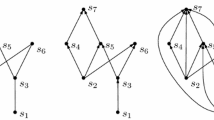Abstract
We show that some recent results in slicing of a distributed computation can be applied to developing algorithms to solve problems in combinatorics. A combinatorial problem usually requires enumerating, counting or ascertaining existence of structures that satisfy a given property B. We cast the combinatorial problem as a distributed computation such that there is a bijection between combinatorial structures satisfying B and the global states that satisfy a property equivalent to B. We then apply results in slicing a computation with respect to a predicate to obtain a small representation of only those global states that satisfy B. The slicing results are based on a generalization of Birkhoff’s Theorem of representation of finite distributive lattices. This gives us an efficient (polynomial time) algorithm to enumerate, count or detect structures that satisfy B when the total set of structures is large but the set of structures satisfying B is small. We illustrate our techniques by analyzing problems in integer partitions, set families, and set of permutations.
Supported in part by the NSF Grants ECS-9907213, CCR-9988225, Texas Education Board Grant ARP-320, an Engineering Foundation Fellowship, and an IBM grant.
Access this chapter
Tax calculation will be finalised at checkout
Purchases are for personal use only
Preview
Unable to display preview. Download preview PDF.
Similar content being viewed by others
References
S. Alagar and S. Venkatesan. Techniques to tackle state explosion in global predicate detection. IEEE Transactions on Software Engineering, 27(8):704–714, August 2001.
R. Cooper and K. Marzullo. Consistent detection of global predicates. In Proc. of the Workshop on Parallel and Distributed Debugging, pages 163–173, Santa Cruz, CA, May 1991. ACM/ONR.
B.A. Davey and H.A. Priestley.Introduction to Lattices and Order. Cambridge University Press, Cambridge, UK, 1990.
S. Effler and F. Ruskey. A CAT algorithm for listing permutations with a given number of inversions. Information Processing Letters, 2002.
U. Faigle, L. Lovász, R. Schrader, and Gy. Turán. Searching in trees, seriesparallel and interval orders. SIAM Journal on Computing, 15(4):1075–1084, 1986.
V. K. Garg. Detecting global predicates in distributed computations. Technical report, Parallel and Distributed Systems Laboratory, ECE Dept. University of Texas at Austin, September 2002. available at http://www.ece.utexas.edu/∼garg/pubs.html.
V.K. Garg and N. Mittal. On slicing a distributed computation. In 21st International Conference on Distributed Computing Systems (ICDCS’ 01), pages 322–329, Washington-Brussels-Tokyo, April 2001. IEEE.
Donald E. Knuth. Sorting and Searching, volume 3 of The Art of Computer Programming. Addison-Wesley, Reading, MA, USA, second edition, 1998.
N. Mittal and V. K. Garg. Slicing a distributed computation: Techniques and theory. In 5th International Symposium on DIStributed Computing (DISC’01), pages 78–92, October 2001.
J.S. Provan and M. O. Ball. The complexity of counting cuts and of computing the probability that a graph is connected. SIAM Journal on Computing, 12:777–788, 1983.
I. Rival. Maximal sublattices of finite distributive lattices. Proc. Amer. Math. Soc., pages 417–420, 1973.
Jeremy Spinrad. On comparability and permutation graphs. SIAM Journal on Computing, 14(3):658–670, 1985.
M. Squire. Gray Codes and Efficient Generation of Combinatorial Structures. PhD Dissertation, Department of Computer Science, North Carolina State University, 1995.
R. Stanley. Enumerative Combinatorics Volume 1. Wadsworth and Brookes/ Cole, Monterey, California, 1986.
G. Steiner. Single machine scheduling with precedence constraints of dimension 2. Math. Operations Research, 9:248–259, 1984.
G. Steiner. An algorithm to generate the ideals of a partial order. Operations Research Letters, 5(6):317–320, 1986.
D. Stanton and D. White. Constructive Combinatorics. Springer-Verlag, 1986.
W.T. Trotter. Combinatorics and Partially Ordered Sets: Dimension Theory. The Johns Hopkins University Press, 1992.
J.H. van Lint and R. M. Wilson. A Course in Combinatorics. Cambridge University Press, 1992.
Author information
Authors and Affiliations
Editor information
Editors and Affiliations
Rights and permissions
Copyright information
© 2002 Springer-Verlag Berlin Heidelberg
About this paper
Cite this paper
Garg, V.K. (2002). Algorithmic Combinatorics Based on Slicing Posets. In: Agrawal, M., Seth, A. (eds) FST TCS 2002: Foundations of Software Technology and Theoretical Computer Science. FSTTCS 2002. Lecture Notes in Computer Science, vol 2556. Springer, Berlin, Heidelberg. https://doi.org/10.1007/3-540-36206-1_16
Download citation
DOI: https://doi.org/10.1007/3-540-36206-1_16
Published:
Publisher Name: Springer, Berlin, Heidelberg
Print ISBN: 978-3-540-00225-3
Online ISBN: 978-3-540-36206-7
eBook Packages: Springer Book Archive




